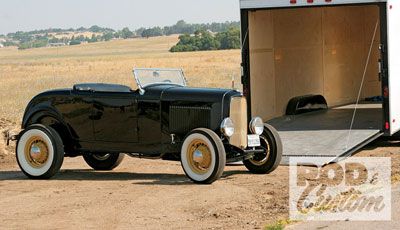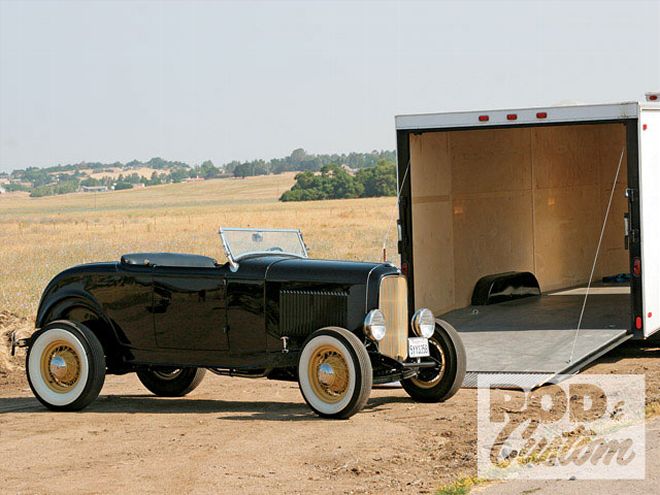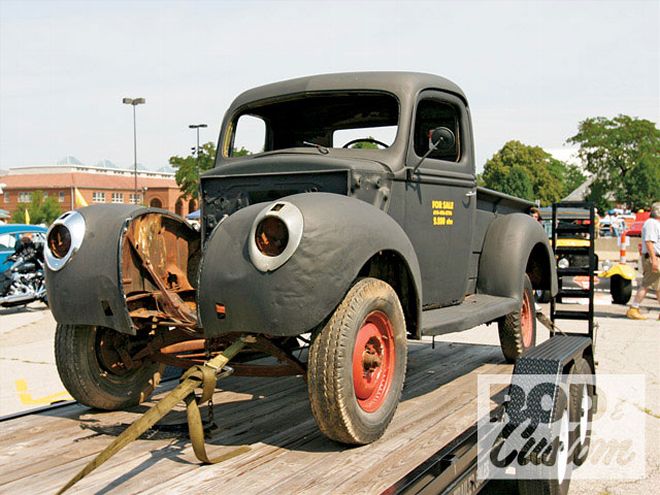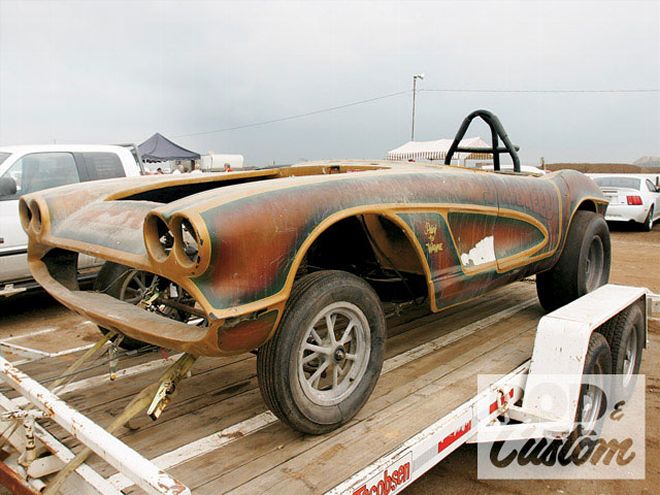

Calling your insurance company to report an accident or damage or theft to your hot rod is never a good experience-and it's worse if you're making the call from the side of the road hundreds of miles from home. Unfortunately, nobody is immune from bad luck. But there are a few things you can do to make that dreaded phone call a little less painful.
This magazine, and every other hot rodding mag out there, has covered the ins and outs of specialty auto insurance many times. This time, we're focusing our attention on some specific circumstances surrounding trailered cars. Yeah, we've sneered at "trailer queens" in the past and probably will in the future, but the reality is that there are good reasons and proper occasions for hauling that hot rod behind a tow vehicle. What we want to talk about today is how trailering your hot rod can affect your insurance coverage.
We started by thinking up as many different potential situations as we could involving hot rods, trailers, and accidents. Then we got on the phone with representatives from some of the bigger and better-known insurance companies to ask them how they would respond to our dreamed-up scenarios. Some of our hypothetical situations were fairly common and some were out of the ordinary-but it's those out-of-the-ordinary episodes that you've got to be prepared for. You can never know ahead of time if you'll need to rely on your insurance coverage, but you should know ahead of time if you can rely on it.
There are a bunch of specialty automotive insurance companies and each one has its own specific rules regarding coverage. We stuck to three of the companies that have been around a long time and earned good reputations. Hagerty and Grundy specialize in hot rods and other types of classic cars; State Farm is relatively new when it comes to hot rod coverage but has been in the auto insurance business for 87 years.

The Fundamentals
Before diving into some of the specifics of trailer issues, let's talk one more time about what type of insurance you should have on your hot rod. An "Agreed Value" policy is the best choice for a hot rod of any value. As the name suggests, "Agreed Value" policies will pay the amount agreed on by the car owner and the insurance company in the event of a total loss or the full cost of repair up to that amount. Keep in mind that agreement might require some mutual compromise between you and the insurance company. You can improve your side of the argument with photographs, receipts, and if necessary, an honest appraisal by an impartial third party. The agreed value may not be as high as the sum of all your receipts or the sentimental value of the car, but it's the best way to protect the investment you have in your car and guarantee you will collect the full amount you expect, with no haggling and no surprises.
Don't confuse "Agreed Value" with a "Stated Value" policy. In the event of a loss, a "Stated Value" policy will pay either cost to repair the car, the value stated in the policy, or the cash value of the car (what the insurance company thinks the car is worth), whichever is less.
Hopefully we don't need to tell you not to just add your hot rod onto the ordinary auto policy you already have for your daily-driver, work truck, and family minivan. It might sound like a money-saving deal, but that type of policy is designed for cars that will depreciate in value. In the event of an accident or loss, the value will be determined by the insurance company.

These distinctions have to do with how much your car is covered for. The other consideration is what your car is covered for. As with an ordinary auto insurance policy, you have coverage options for collision, comprehensive (any damage or loss that is not collision-related, such as a fire or theft), and liability (protection in the event of causing damage to another person or their property).
Trailer Hitches
All specialty car insurance comes with conditions restricting driving. Typically, protected uses include driving to car shows, road trips, cruises, parades, and other hobby-oriented activities. Prohibited activities typically include non-hobby activities such as commuting to work or school and using the car to run errands.
We wanted to find out how various trailering scenarios would fit within the rules of allowed uses. So we contacted Kip Diggs at State Farm, Chuck Wasoski from Grundy Worldwide, and McKeel Hagerty of Hagerty Insurance with our long list of questions and hypothetical scenarios. Some of them are drawn from actual incidents we'd heard about in the past, and all of them possible. As you'd expect, each company's answers differed, but they were all fairly consistent.
Q: Is coverage available for a newly purchased, complete (or mostly complete) hot rod being trailered from the place of purchase to my home or shop?
McKeel Hagerty assured us that as long as the new owner places coverage on the vehicle prior to transport or delivery, that vehicle would be protected under his policy while in transport. Wasoski said that Grundy provides 14-day automatic coverage to its customers on newly purchased vehicles. As you probably guessed, that applies to existing customers-not to people who intend to become customers.
Q: What if the newly purchased car was purchased in unfinished condition or as an assortment of disassembled parts? Is it still covered during transport?
Hagerty Insurance does cover vehicles under restoration and offers additional coverage for spare parts for any collector vehicle for an additional premium. The same applies with Grundy. Wasoski told us that many hot rodders make the mistake of neglecting to insure a project car before it's finished and risk losing their investment if there's a fire or theft. Many rodders assume that an unassembled or partially assembled vehicle in their garage is protected by their homeowner's policy, only to find out it isn't when trouble occurs. State Farm, Diggs informed us, would definitely cover a licensed and already-insured vehicle that had been driven and was undergoing upgrades or a rebuild, but probably would not cover an incomplete vehicle that they didn't have a policy on prior to tearing it apart.
Q: Am I covered when trailering an in-progress project car from one shop to another, such as from the body shop to the paint shop?
Hagerty, Grundy, and State Farm all confirmed that the protection would remain on the car in those situations. State Farm told us that those scenarios could be considered maintenance or upkeep of the vehicle and would be covered. Diggs went on to talk about protection if a car is damaged or stolen while at another shop. Although he said it's a case-by-case basis, and many shops display signs claiming no responsibility, businesses are expected to provide "reasonable care," and the insurance company could cover your loss and turn around and try to recover your deductible and the insurance company's payout.
Q: What if my finished hot rod is damaged on the trailer while on the road?
The companies we talked with would cover the damage to the hot rod. If the damage was the result of a collision, the protection would be provided by the collision coverage in your policy, if not by the insurance of the other driver. If the damage was caused in some other way-such as a fire in the trailer, vandalism, something falling on the car, or the trailer tipping over or rolling off the road-the protection would probably be provided by comprehensive coverage, just like it would be if the damage occurred at home. The answer here is to make sure you're covered enough with collision and comprehensive.
Q: Does coverage change if the hot rod is damaged as a result of rolling off the trailer, or if the trailer and car become unhitched from the tow vehicle?
We were trying to think like lawyers here, sniffing out potential insurance company loopholes, but State Farm, Grundy, and Hagerty assured us that a full-coverage policy on the car involved would apply and would pay for any collision or comprehensive damages to the car in those situations.
Q: Does it affect coverage if the trailer is not the property of the car owner-such as a rented or borrowed trailer, or if it's an open trailer or closed trailer?
That was our "gotcha" question, but the answer is no. According to Hagerty, if coverage is in place on the vehicle inside the trailer, regardless of the ownership or type of trailer, any collision or comprehensive damage to that vehicle is covered.
Q: Is it necessary to have separate insurance coverage for the trailer?
Insuring the trailer is separate business from insuring the car. The trailer must be insured in order to be covered for any physical damage to the trailer or liability caused by it; the trailer wouldn't be covered by the hot rod policy. The companies we talked with may be able to provide trailer insurance for their customers in addition to the collector car policy.
Obviously, insuring the tow vehicle is also a separate deal. In the majority of cases, the tow vehicle is not a classic or specialty vehicle and would be insured with an ordinary actual cash value type of policy, just like you'd have on your daily-driver. Liability insurance on the tow vehicle would likely cover property damage or personal injury caused by the trailer while it's being towed.
Q: What if the tow vehicle is a classic or specialty vehicle?
We saw this scenario a lot at Bonneville, where teams would use a classic truck as a tow and support vehicle. Since that type of vehicle would not comply with the use restrictions of most specialty car insurance companies, it would be tough to get it covered with an "Agreed Value" policy. Even though it might have a high value, it would probably need to be insured with a traditional auto policy.
All of the insurance company reps we spoke with were glad to talk to us and didn't mind answering all our picky questions. If you are unclear about your insurance coverage, do what we did: call up your insurance company and bug them with questions until you understand what's covered and what isn't. Assume nothing, and make sure that everything you're told is backed up in writing in your policy.
An insurance policy is a piece of paper handed to you when you pay. Kip Diggs at State Farm describes it as a promise that says that when something happens to your vehicle, the insurance company will take care of it. Words spoken over the phone-or written in a magazine-won't protect the investment you have in your hot rod. That piece of paper is the only thing that will. It's better to find out what is and isn't covered now instead of out there on the side of the road.